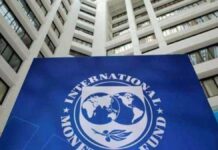
LAHORE: The International Monetary Fund (IMF) team concluded its week-long visit on Thursday and issued a report stating Pakistan was confronted by a difficult economic situation, with high fiscal and current account deficits and low foreign exchange reserves.
The IMF delegation was led by its Washington-based mission chief Harald Finger and over a week-long visit discussed the country’s economic situation and exchanged views on necessary policies for economic stabilization, sustainable and inclusive growth.
Mr Finger in a statement said “Pakistan is facing an increasingly difficult economic situation, with high fiscal and current account deficits, and low international reserves.
He added this reflected in an overvalued exchange rate, loose fiscal policy and accommodative monetary policy and fast rise in international oil prices, normalization of US monetary policy, and tightening financial conditions for emerging markets are adding to this difficult picture
Moreover, Mr Finger cautioned economic could slow significantly and inflation will increase.
He said, “The team welcomes the policy measures implemented since last December. These include 18 percent cumulative depreciation of the rupee, interest rate increases of cumulatively 275 bps, fiscal consolidation through the budget supplement proposed by the minister of finance, a large increase in gas tariffs closer to cost recovery levels, and the proposed increase in electricity tariffs. These measures are necessary steps that go in the right direction.”
The IMF said in the near-term additional decisive policy action alongside a comprehensive strategy and significant external financing will be required.
It called for more exchange rate flexibility, monetary policy tightening, further fiscal adjustment linked to medium-term consolidation strategy and strengthening the performance of key public enterprises clubbed with further rises in power and gas tariffs.
According to the IMF, the aforementioned measures would help in decreasing current account pressures and improve debt sustainability.
Moreover, the IMF stressed it was important to provide to vulnerable segments of society and there was a need to further strengthen social protection via the Benazir Income Support Program (BISP).
It believes these policies would help stabilize the economy and lay for sustainable and inclusive growth.
The Washington-based lender said, “Once stabilization is beginning to take hold, the focus should increasingly shift to reforms to foster sustained and inclusive growth and strengthen key institutions.
Priority areas include modernizing the tax system and public financial management, strengthening fiscal federalism arrangements, improving governance and eliminating losses of public enterprises, enhancing the SBP’s autonomy, intensifying AML/CFT efforts, improving the business climate and anti-corruption efforts, and fostering the economic inclusion of the poor, youth, and women.”
It concluded, “The team is grateful to the authorities for open and constructive discussions. The team met with Minister of Finance, Revenue and Economic Affairs Asad Umar; Minister of Planning Khusro Bakhtiar, Advisor to the Prime Minister for Commerce Abdul Razak Dawood, Advisor to the Prime Minister for Institutional Reforms and Austerity Ishrat Hussain, SBP Governor Tariq Bajwa, Finance Secretary Arif Ahmed Khan, FBR Chairman Mohammad Jehanzeb Khan, other senior officials, and representatives of the private sector and development partners.”





